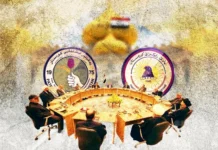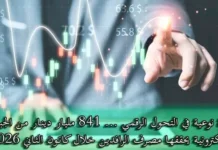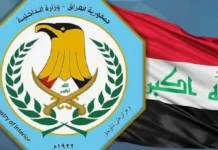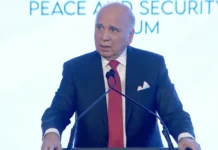Tishwash: International Monetary Fund: We do not rule out the collapse of the global monetary system
The Executive Director of the International Monetary Fund for Russia, Alexei Mugin, said that he does not rule out the possibility of the collapse of the current global monetary system.
In an interview with the “Novosti” agency, Mogin asked: “Is there a possibility of the collapse of the global monetary system? It seems to me that such a possibility actually exists.”
The expert stated that the currently existing system relies on confidence that dollar assets are safe, but central banks, institutions, and even families have already begun to sell dollar assets and buy gold, due to growing lack of confidence in their safety.
Mogin warned of chaos in the global economy, and said: “Once this confidence is lost, a period of chaos will occur in the global economy.”
Last April, the International Monetary Fund warned, in its financial monitoring report, that the debts of the United States and China pose a threat to global finances.
The rise in US public debt and the dependence of global trade on the dollar raises concerns among experts and a number of countries around the world.
Data issued by the Treasury Department, earlier this month, revealed that the US budget deficit exceeded one trillion dollars in the first six months of the fiscal year, partly paid for by the rise in interest on public debt. link
Tishwash: Iraq increases its gold holdings by more than three tons, bringing its reserves to more than 145 tons
Iraq’s gold reserves witnessed a noticeable increase during the month of February 2024, as International Monetary Fund data showed that Iraq had increased its possession of the precious metal by 3,079 tons, bringing the total to 145,661 tons.
This increase indicates Iraq’s continued strategy to diversify its foreign reserves and enhance financial and monetary stability in the long term.
Gold is a traditional safe haven for investors, especially during periods of economic and geopolitical uncertainty.
This step by Iraq comes at a time when the world is witnessing a rise in gold prices, as the price reached its highest level in its history last month above $2,400 per ounce.
Iraq is among the countries that possess large amounts of gold reserves in the Arab region, as it ranks fourth after Saudi Arabia, Algeria, and Morocco.
In general, this increase in Iraq’s gold reserves is considered a positive indicator of the health and strength of the Iraqi economy. link
************
Tishwash: Chinese companies are delving into the field of exploration in Iraq.. What about American and European companies?
Iraq aspires to increase oil reserves to more than 160 billion barrels, and to do so it has launched a group of projects to increase production, opening the door to more investments in the field of exploration.
In this context, Chinese companies have emerged as a major player, after a number of companies won more new investments to explore oil and gas fields in Iraq as part of a licensing round to develop the oil and gas sector in the country launched by the Ministry of Oil.
The licensing round included 29 projects, aiming to increase production for local consumption. More than 20 companies qualified for the licensing round, including European, Chinese, Arab and Iraqi groups. The only Chinese companies among the participating foreign companies were able to obtain investments in the licensing round that began on Saturday, and this This means that there are no major American oil companies participating.
The list of Chinese companies that recently won the new bids, according to what was announced by Iraqi Oil Minister Hayan Abdul Ghani on Sunday, included: the Chinese company “CNOOC Iraq” , which won the investment to develop Block 7 for oil exploration, extending over an area of 6,300 square kilometers across the provinces of Diwaniyah. Babil, Najaf, Wasit, and Muthanna in the center and south of the country.
Zhenhua , Anton, and Sinopec also won investments to develop the Abu Khaimah fields in Muthanna, Al Dhafriya in Wasit, and Sumer in Muthanna, respectively.
*Support competition
In turn, the director of the Iraqi Center for Studies, Ghazi Faisal, confirms in a press statement that “China is in fact in a state of widespread economic competition with America, the European Union countries, Britain, and with various international economic powers,” noting that “China enjoys broad economic influence in the fields of Investment, loans and financing, with the aim of ensuring energy security and covering its daily needs – which are estimated at about 11 million barrels per day, the volume of China’s imports – other than gas.”
He added, “The Middle East and the Arabian Gulf region is one of the strategic regions for China… and therefore competes with American and regional companies in the field of gas, energy, and manufacturing industries,” noting that “the Middle East region possesses enormous wealth, especially Iraq, which alone possesses more than $20 worth of wealth.” A trillion dollars in minerals are still uninvested, and major companies can compete to enter into large-scale investments, in addition to gas and oil reserves, as Iraq is the second largest oil reserve after Saudi Arabia.”
He explains that “this Chinese activity in Iraq comes within the framework of the current international economic competition,” noting that “China is competing in particular with American and European companies to provide the best.”
Faisal adds, “China’s activity comes within the framework of legitimate competition in international economic relations, to obtain the best gains and to guarantee China’s interests and needs for minerals and energy in light of its possession of the best advanced technology in various industries.”
According to official Chinese data, issued by the General Administration of Customs, Beijing’s imports of crude oil reached their highest levels ever in 2023 as demand for fuel recovered after the decline resulting from the Corona pandemic, despite the economic headwinds.
Imports increased by 11 percent compared to 2022 to 563.99 million tons, or the equivalent of 11.28 million barrels per day, an increase from the previous record level recorded in 2020, which reached 10.81 million barrels per day.
*Strategic objectives
For his part, the professor of economics in Iraq, Nabil Al-Marsoumi, explains in a press statement that “It is noted that China has broad control over the fields offered within the current licensing round for exploration that was put forward by the Ministry of Oil, and that most of the Chinese companies that won contracts are already present in Iraq.” “, adding that “the most important areas and fields that were awarded were owned by Chinese companies in particular.”
He explained that “China’s interest in Iraq is due to the presence of Baghdad as a global energy center and as one of the largest producers,” adding that “China is a large importer of oil, and therefore it needs to secure energy supplies on a regular basis, and Iraq achieves this.”
He stressed that “Iraq is a suitable place for China in light of the ability of Chinese companies to harmonize with the Iraqi environment, thus supporting their ability to achieve strategic goals.”
On Saturday (May 11, 2024), the Iraqi Minister of Oil, Hayan Abdul Ghani, expressed his hope that the country’s oil reserves would exceed 160 billion barrels, during the launch of two rounds of new licenses to invest in 29 fields, in addition to exploratory patches of oil and gas.
The two tours included exploration fields and areas in 12 governorates and areas located in Iraqi territorial waters.
*An important investment environment
In addition, the Iraqi economic expert, Dr. Jaafar Al-Husseinawi, pointed out in a press statement that “There is no doubt that Iraq represents an important investment environment for all international companies because of its enormous natural resources of crude oil, major untapped gas reservoirs, large quantities of phosphate and sulfur, and so on.” that”.
He added, “Companies are flocking to Iraq – including Chinese companies – driven by the desire to achieve economic returns and real investment opportunities, from an economic standpoint.”
On the political level, Iraq’s location is of particular importance in the region, and therefore China is trying to be present there and remove American control (influence).
The Iraqi Prime Minister, Muhammad Shiaa Al-Sudani, said during the launch of the licensing round, “Iraq expects to obtain more than 3,459 million standard cubic feet per day of gas, and more than one million barrels of oil per day, through these two rounds.”
He added: “These strategic projects will contribute to increasing investments in these governorates, which will help improve their economic and service reality.”
*Developed relationships
Mustafa Al-Bazarkan, an advisor on energy affairs, points out that “commercial and political relations between China and Iraq are “developed,” and there is popular support for the government’s steps to strengthen and develop bilateral relations, especially in light of popular positions opposed to strengthening relations with Washington and London. This was in the interest of the developed relations with China.” .
He continues: “During the past two years, there has been more than one departure of American and Western oil companies from Iraq, which prompted Chinese companies to direct their investments and technical expertise to Iraq, the most recent of which was last Monday when a Chinese company won oil investments in the Jabal Sanam region on the border with Kuwait.”
Crude oil sales constitute 90 percent of Iraqi budget revenues. But despite its enormous oil wealth, the country still depends on imports to meet its energy needs, especially gas to power electricity.
Iraq, a founding member of OPEC, has announced its commitment, along with other countries, to voluntarily reduce production to support prices affected by economic uncertainty.
Iraqi Oil Minister Hayan Abdul Ghani said on Sunday (May 12, 2024) that Baghdad will adhere to the voluntary production cuts reached by the OPEC+ alliance at its next meeting on June 1.
The coalition includes the Organization of the Petroleum Exporting Countries (OPEC) and producers from outside it, led by Russia.
The minister amends these statements from others he made on Saturday, saying that Iraq has made enough voluntary cuts and will not agree to any new cuts in production. link





